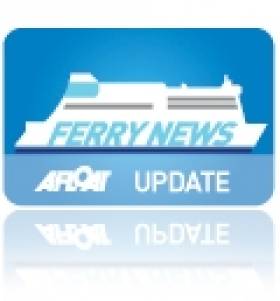Displaying items by tag: IrelandFrance ferry routes
Winter Launch of New Continental Routes to Heat-Up Competition
#FerryFrance – It may only be the first month of 2014, yet two new direct Ireland-France ferry routes are launched. Irish Ferries Dublin-Cherbourg route which opens today and LD Lines Rosslare-St. Nazaire-Gijon (Spain) services which began last weekend, writes Jehan Ashmore.
Irish Ferries new 19-hour route connecting the capital and the continent is served by the 500 passenger ro-pax ferry, Cartour Epsilon.
The same ferry design from the shipyard of Visentini also applies to the Scintu, that launched the LD Lines service. She departed Rosslare yesterday on her second call to the port as the renamed Norman Atlantic, to reflect her Irish-Iberian 'landbridge' route role.
Never before has there been so much choice in services between Ireland and France with five routes served by four operators. This increased level of competition can only be good news for passenger customers and freight hauliers.
In addition to Irish Ferries new route, the ferry firm also operates the cruiseferry, Oscar Wilde on the established routes of Rosslare-Cherbourg, reopening late February and a high-season service to Roscoff.
Rosslare port is also home to Celtic Link Ferries operations on the Cherbourg route served by another Visentini built ro-pax, Celtic Horizon.
Final player on the Ireland-France market, Brittany Ferries run the Cork-Roscoff service which is to resume in mid-March with crossings carried out by flagship Pont-Aven.
























































